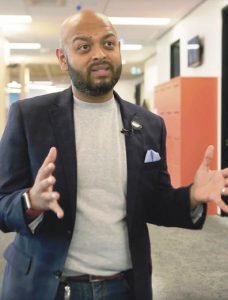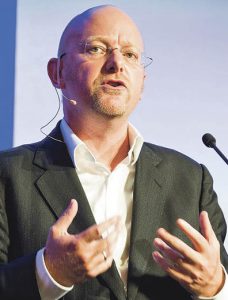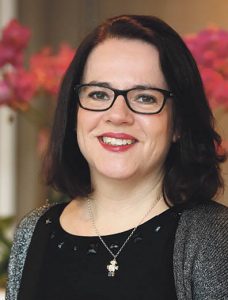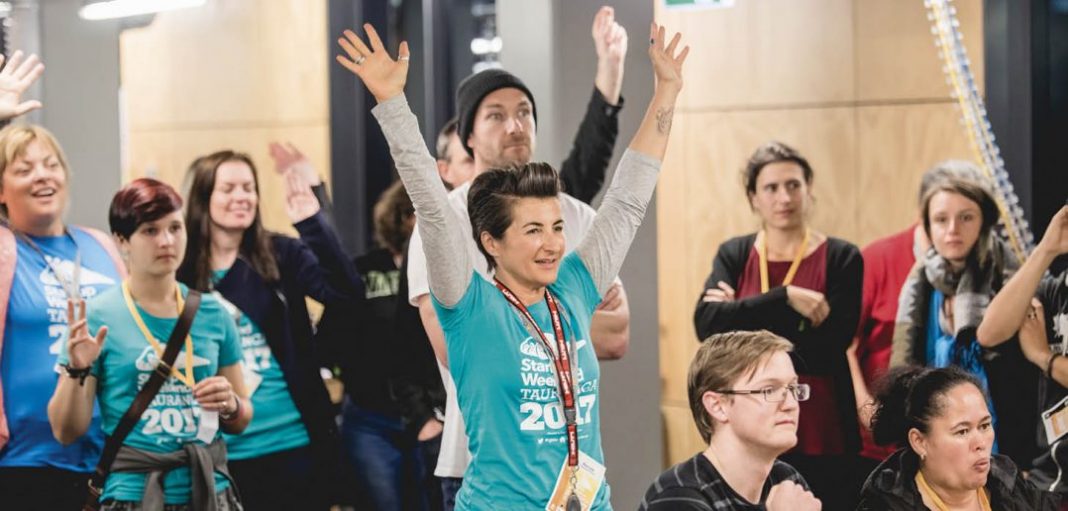Leading technology and business experts will illuminate the key challenges of digital transition during Tauranga’s second annual week-long festival of innovation.
The inaugural Groundswell Festival of Innovation in 2017 proved there are hundreds of innovators in Tauranga and the Bay creating remarkable products and services. And that they are more than willing to share their knowledge.
Isuru Fernando, IBM NZ

This year’s festival – which will run from 27 August-2 September – is poised to build on that momentum, say the organisers and innovators taking part in what many believe will become an even bigger regular event on the city’s calendar.
“What’s really special about Groundswell is the incredibly positive and collaborative atmosphere you experience at each event,” said Nigel Tutt, chief executive of Priority One, which initiated Groundswell.
“Everyone who attends is genuinely interested and engaged, and it’s really encouraging to hear so many stories of innovation taking place across a diverse range of contexts. Not all businesses are innovation-led, nor do they have to be. But change is inevitable, and it never hurts to listen to others and hear thought-provoking stories of what is happening right now – and what is possible in
the future.”
Russell Craig, Microsoft NZ

Groundswell features a range of events from digital technology and clean tech, to fashion and textiles, to social and educational innovation, all featuring leading tech innovators. All events sold out last year, with attendance across the week reaching 5000, and the organisers are expecting an even bigger turnout this year. (see pages 8-9 for full details of what’s on).
Jodie Tipping, the chair and founder of co-sponsor Cucumber, who is on the Groundswell organising committee, told Bay of Plenty Business News there were many exciting things happening on the innovation front.
“But it was getting to a point a couple of years ago that you just weren’t hearing about them and that’s why we developed Groundswell,” she said.
“My personal ultimate goal would be to see Groundswell become a movement of its own and not just a one-off festival, because innovation touches so many different organisations.
“It’s not just tech or whatever, it’s very broad. The more we can create a community and awareness of things that are happening, the better it will be for our community.”
Managing digital transformation
One of the key challenges – especially for many of the small-to-medium enterprises (SMEs) that make up the great majority of business activity in New Zealand – is the sheer pace and scale of the digital transformation that has taken place in recent years.
Liz Maguire

Liz Maguire, head of digital transformation for ANZ, who will be speaking at Groundswell, said that companies had to be across new technologies and work out whether they were going to be valuable to them.
“One of the big quandaries we have in our world is how do you tell if something is a trend or a fad,” she said.
“The fundamental reality is that people do not change their behaviour and adopt new technology unless there is something better about it for them. For the vast majority of people, there has to be a reason why you are going to use it.”
As Isuru Fernando, IBM New Zealand analytics & AI leader, told Bay of Plenty Business News: “Disruption is all around us – with examples like Uber and Airbnb – companies that have reinvented business models.”
Disruptive technologies such as Artificial Intelligence (AI), Internet of Things (IoT), or Blockchain were no longer the sole domain of large companies with big budgets, he added.
Jodie Tipping

“We are seeing many small-to-medium organisations right here in New Zealand making use of these technologies to power their ideas. They are able to start small, experiment and then build out the ideas that work, quickly and easily.”
Fernando said IBM NZ was partnering with great local organisations and startups that were exporting their products and services all over the world.
“And what is also interesting is that the large incumbent organisations in New Zealand are thinking like startups,” he said.
“They are structuring their innovation teams to resemble those of small organisations and making a comeback by building platform business models using all of the data available to them, and turning it into insight. And they’re adopting Agile methodologies, using it as an innovation engine for business transformation and employing new ways of working to foster speed-to-market and competitive advantage.”
Russell Craig, Microsoft NZ’s national technology officer, said that globally there was an incredible phenomenon of acceleration in the tech sector.
“The challenge that people – particularly in smaller businesses – or non-commercial organisations, face at the moment is how to make the right choices.“It’s very hard for everyone to keep up,” said Craig.
“The first challenge is trying to wrap your head as an organisation around what’s actually happening in this area of digital transformation, because in many ways it’s quite an abstract concept.
“At the same time, most people are alert to some of the more obvious sweeping changes that are taking place. Look at the retail shelf space and the phenomenon of Amazon there.”
“One of the big quandaries we have in our world is how do you tell if something is a trend or a fad.” – Liz Maguire, ANZ
“That’s going to extend to all our businesses in New Zealand eventually, no matter what industry they are in.”Retailers were already facing the challenge with online shopping, and the media had been dealing with it, he said.
First find the relevance
Craig said technology came second in terms of making the right choices.
“First you need to understand how technology could be relevant to your business to help you change for the future,” he said.
“It’s important to try and make things real at the local level. For example, with Airbnb, local businesses need to ask themselves what it is that consumers like about it. It’s the flexibility and convenience. If you’re a local motelier, how can you use digital to somehow match that customer experience of finding somewhere to stay? That’s all it’s really about.”
Craig said one of the things he’d be talking about at Groundswell was trying to frame up the idea of digital transformation.
“The challenge that people – particularly in smaller businesses or non-commercial organisations – face at the moment is how to make the right choices.” – Russell Craig, Microsoft NZ
“And obviously cloud computing, the technology platform that can enable any business from a local plumber through to Microsoft’s just- announced strategic deal with Walmart. Why did they partner with us? Because they need to compete against Amazon.”“What does it mean from a global perspective? What’s happening in the technology sector, with particular relevance on the impact of technologies such as AI, machine learning, big data and analytics?
ANZ’s Liz Maguire said everybody was looking at how to handle the impact of digital transformation. She noted that the scale of change could be easily seen in the banking sector, with less than two percent of payments now happening in a bank branch these days.
“There are amazing pockets of innovation in the country,” she said.
“But my sense of it is that there’s a worrying amount of companies that haven’t done as much as they should have. I think there’s much more that could be done.”
” We are seeing many small-to-medium organisations right here in New Zealand making use of these [disruptive new]technologies to power their ideas.” – Isuru Fernando, IBM NZ
Maguire said there was a need to address the practical issues.
“There’s lots of theory, there are lots of academic models. But the thing for many companies is, ‘where do I start? How do I get my board across this? How do I really understand whether what I’m doing is good for our customers? I’ve got 101 things to do, so how do I really know which ones are important’.”
Cucumber’s Jodie Tipping said that in both larger and smaller business there were people who are scared of technology.
“They don’t really know what to do and what not to do, and I don’t think it’s just in the small business space,” she said.
“We advocate ‘little and often’ – don’t be scared to try things. We work with organisations to understand what their customers are doing, to make sure they’re applying the right technology for the business they’re in.
“Groundswell is an opportunity for the community to actually create what they want Tauranga and the region to be, rather than waiting for things to happen. I really hope it gains momentum.”
Priority One’s Nigel Tutt said the organisers were excited about the breadth and depth that had emerged for this year’s event.
“The more we can create a community and awareness of things that are happening, the better it will be for our community.” – Jodie Tipping, Cucumber
“The Tauranga Art Gallery and Toi Ohomai School of Creative Industries will be alongside the likes of PowerSmart, Cucumber and Google’s leading education expert,” he said.
“Bringing people together to create unexpected connections and have meaningful conversations is a big part of the festival – it’s how ideas like Groundswell came about and who knows what will come out of this year’s festival?”
SHARE.




